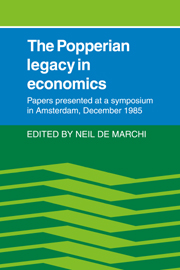Book contents
- Frontmatter
- Contents
- Preface
- List of contributors
- Introduction
- Discussion
- Part I Popper as a philosopher of science
- Part II Popper among the economists
- Part III Falsification and trying to do without it
- 5 The case for falsification
- 6 John Hicks and the methodology of economics
- Part IV The missing chapter: empirical work and its appraisal
- Part V Non-Popperian perspectives on economics
- Index
6 - John Hicks and the methodology of economics
Published online by Cambridge University Press: 05 January 2012
- Frontmatter
- Contents
- Preface
- List of contributors
- Introduction
- Discussion
- Part I Popper as a philosopher of science
- Part II Popper among the economists
- Part III Falsification and trying to do without it
- 5 The case for falsification
- 6 John Hicks and the methodology of economics
- Part IV The missing chapter: empirical work and its appraisal
- Part V Non-Popperian perspectives on economics
- Index
Summary
Sir John Hicks's career in economics spans more than fifty years, in the course of which he has published fourteen books, including six collections of almost one hundred essays. In some of these, particularly Value and Capital (1939) and A Revision of Demand Theory (1956), there are hints of Hicks's general attitude to the nature of economics, but it is only recently that he has become more explicit about his views on the methodology of economics. A 1976 essay on ““Revolutions” in Economics” voiced doubts about the applicability of Lakatos's philosophy of science to economics; the opening and closing chapters of Causality in Economics (1979) threw up similar doubts about the wider question of empirical testing in economics; and, finally, an essay written in 1983 with the pointed title of “A Discipline Not a Science” decisively parted company with all varieties of empiricism, Popperianism, falsifiability, or call it what you will, in economics.
Economics as a discipline not a science
After observing that economic theories can offer no more than “weak explanations” for economic events because they are always subject to a ceteris paribus clause–a feature that he appears to believe is unique to economics–Hicks concludes:
it becomes clear that they cannot be verified (or falsified) by confrontation with fact. We have been told that “when theory and fact come into conflict, it is theory, not fact, that must give way” [a quote from R.G. Lipsey]. […]
- Type
- Chapter
- Information
- The Popperian Legacy in EconomicsPapers Presented at a Symposium in Amsterdam, December 1985, pp. 183 - 196Publisher: Cambridge University PressPrint publication year: 1988
- 6
- Cited by



